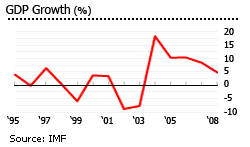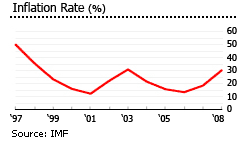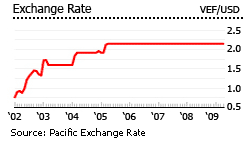Avoid Venezuela while Hugo Chavez is still around
For most international property investors, the mere mention of Hugo Chavez's revolution to create a "21st-century socialism", is enough to make them avoid Venezuela.
And in reality, there are more and more reasons for investors to avoid Venezuela, while Chavez is still in power.
1. Hugo Chavez could become president for life
In his quest to stay in power, Chavez has managed to amend the constitution several times, first to allow reelection and lengthen each term from five to six years.
Political instability has been the norm under Chavez. In 2002, Chavez was ousted in a coup, but was quickly reinstated after a counter-coup. In 2004, he survived a recall referendum. There were several mass protests to denounce his increasingly authoritarian rule, and several counter protests by his avid supporters.
After narrowly losing a 2007 referendum to scrap term limits, he gave dole-outs to loyal Chavistas and the public, seeking to buy popularity. In December 2008, Chavez got his wish - a constitutional revision, allowing him to run for president, indefinitely.
The National Assembly has been transformed into a runner-stamp legislature that allows Chavez to rule by decree. He has blocked the renewal of a media license to an outlet critical of his policies. There has been continuous harassment of critics and of the political opposition.
It is becoming more and more likely that Chavez will become president for life, especially with his win-at-all-costs strategy and he is still relatively young at 54.
2. Oil money is being spent on social welfare politics
Venezuela's economic growth for the past few years has been closely linked to the movement of oil prices. After contracting by an average of 8.3% in 2002 and 2003, Venezuela's GDP growth surged 18.3% in 2004. Then growth averaged 9.69% from 2005 to 2007.
Oil and gas account for more than 90% of exports, around half going to the US.
With the US in recession and oil prices drastically down, economic growth in 2008 slowed to 4.8%. The economy is expected to contract by more than 5% in 2009 and in 2010. More people will then be in poverty than when Chavez assumed office.
Chavez would have been better equipped to tackle the crisis, had he not abolished the FIEM (Fondo de Inversión Para la Estabilización Macroeconómic or Macroeconomic Stabilization Investment Fund) in 2003. The FIEM was a rainy-day fund intended to save windfall profit from oil exports. At its peak in late-2001, it had more than US$7 billion.
After FIEM was converted to a FEM (Macroeconomic Stabilization Fund) with only US$700 million left in its coffers, oil profits were channeled to the FONDEN, the national development fund, which is controlled directly by the president with no accounting or legislative oversight whatsoever.
FONDEN was used as Chavez' personal war chest to fund electoral victories through massive dole-outs to poor and middle-income households, such as free medicine, healthcare, education and subsidized food and fuel.
However, the spending is clearly unsustainable. Thanks to high international oil prices, around US$57.4 billion were transferred to FONDEN from 2004 to 2008, almost all were immediately spent. In order to boost Chavez' international standing, some of the money were given as aid to other countries. He also gave subsidized fuel to "poor households" in the US.
At end-2008 FONDEN only had US$6.07 billion left. The government then raided the central bank's coffers, ordering it to transfer US$12 billion to FONDEN in January 2009.

Venezuela's original budget for 2009 assumed oil prices at around US$60 per barrel. With oil prices currently moving within the US$45 - US$50 range, the government has announced tax hikes and spending cuts to address the deficit.
With international borrowing almost impossible, the government will have to borrow internally. The VAT hike from 9% to 12%, and the increase in domestic debt, will squeeze further the already diminished formal market.
3. Stagflation looms because of economic mismanagement
Venezuela's economy is expected to contract. But inflation is expected to remain high in 2009 and 2010, at around 30%, similar to the 2008 inflation level.
Macroeconomic mismanagement pushed inflation to levels among the highest in Latin America. Average inflation from 2000 to 2007 was 19%, and never since 1983 has inflation fallen below 10%.
The main factor pushing inflation is high food prices; Venezuela imports about two-thirds of its food needs. To control inflation, in 2003 the government imposed price controls on around 400 basic foods. However the mandated prices are way below production costs. This has led to more scarcity - and even higher prices.
The food shortage has been exacerbated by Chavez' land reform. Ranches and land belonging to the wealthy and political opposition have been seized, and distributed to loyal Chavistas and political allies.

The recipients are typically less productive than the previous owners (a lot were poor urban dwellers, with no knowledge of farming).
The situation is getting worse. In February 2009, the government ordered the military to seize rice processing plants, accusing the owners of rice hoarding and flouting price control rules.
4. Currency controls have been imposed
Foreign investors should be aware of currency controls, imposed in March 2005.
The Venezuelan Bolivar (BCV) was pegged to the US dollar at US$1 = BCV2,150. In January 2008, the Bolivar was replaced by the "strong bolivar" (VEF) by dividing everything by 1,000, the new official exchange rate is now US$1 = VEF2.15. However, the value of strong Bolivar in the black market is much lower, at around VEF5.50 - VEF5.75 per US dollar.
The currency controls bring unnecessary complications. Real estate transactions are typically negotiated, and concluded in US dollars (sometimes in euro or British pounds), but are not reported to the government.

Developers supposedly selling freehold titles in Isla Margarita (located north of Venezuela along the Caribbean) use all tricks available, to avoid currency controls (actually, they are only selling timeshares).
Food exporters smuggle their goods to neighboring Colombia. Food importers find it extremely expensive to buy dollars in the black market, and often decide to smuggle goods instead.
5. Property rights are increasingly insecure
Chavez has publicly declared his intention to solve the housing crisis. But Chavez himself has partly created it, by constructing significantly less new housing than his predecessors.
His predecessor Rafael Caldera built 341,000 houses from 1993 to 1998, an average of 68,000 units a year, and President Carlos Andres built around 313,000 houses from 1988-1993, an average of 62,000 units annually. But Chavez' government has built only around of 16,000 new houses a year. The government builds about 60% to 80% of all Venezuela's new housing.
The drop in the number of new houses constructed has been accompanied by threats of expropriation, and warnings that price control on house resales may be imposed.
The expropriation of companies, ranches and properties is an inherent part of the Chavez socialist revolution. The administration openly tolerates the popular expropriation of properties and the violation of property rights. In Altos Mirandinos, 683 'property invasions' were recorded in 2005 in which houses were simply seized by squatters.
The result is a chronic under-supply of housing, which has aggravated social tensions and become a burning issue.
"I have no problem in signing a decree to regulate housing prices in the secondary market," President Chavez has said.
"If someone in Caracas has five apartments and refuses to sell at the regulated price, we'll implement an expropriation decree for the public good and pay the owner what the apartment is really worth!" From the start of Chavez' administration, businessmen have feared that this could happen.
For what it is worth, Venezuela is an open market to foreigners. Any foreigner can buy property in Venezuela with just a valid passport, a tourist visa and a Registro de Información Fiscal (RIF).
The RIF is a fiscal identification for all persons, and can be obtained for free by request at any Tax Administration office or the Servicio Nacional Integrado de Aministración or through a lawyer.